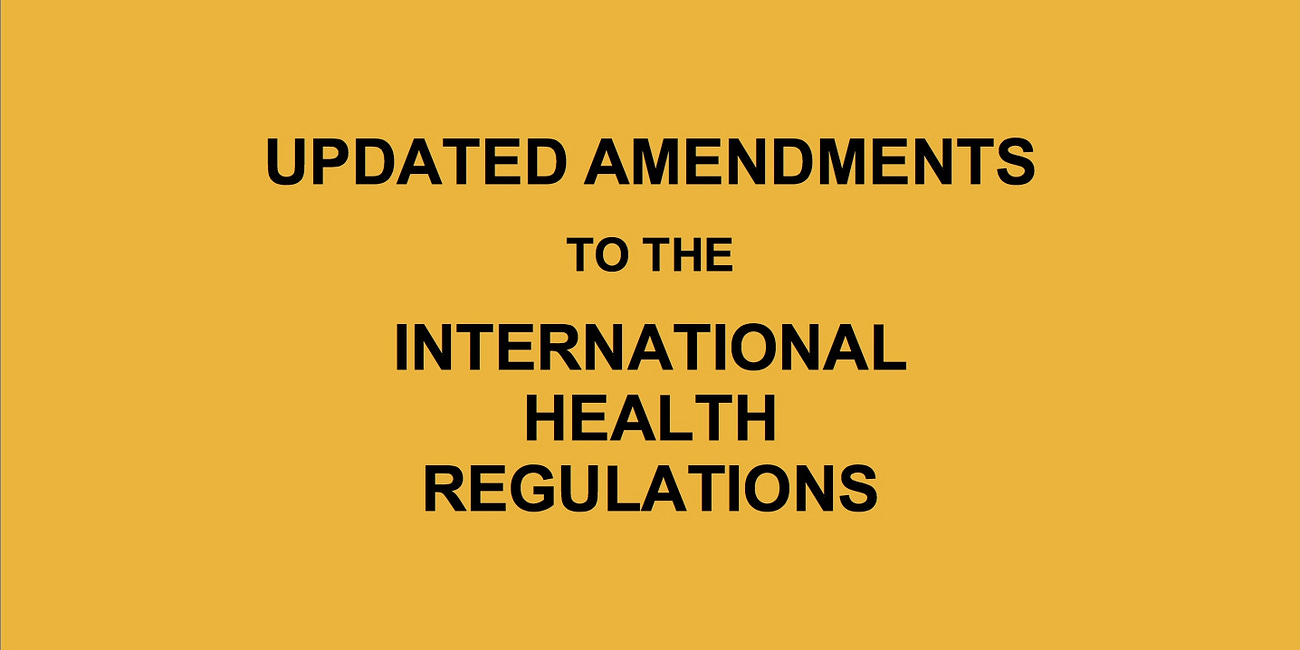Bad Amendments
The amendments to the International Health Regulations are NOT what you may have been led to believe. Don't be distracted. Stay focused. These amendments are bad and they must be rejected.
After more than a year of secrecy, the Working Group for amendments to the International Health Regulations (WGIHR) has finally released an official updated draft of the proposed amendments.
The latest proposal absolutely fails to address any of the issues that need to be addressed.
To allow the WHO to adopt these amendments as if they will help in any way is deeply misguided.
The ongoing claims that the WHO negotiations are an attack on national sovereignty are red herrings.
The WHO negotiations are NOT an attack on national sovereignty.
The WHO negotiations are NOT about mandates or lockdowns.
The WHO negotiations are NOT about attempting to seize control of the doctor-patient relationship.
I STRONGLY SUGGEST that you forget everything that you think you know about the proposed amendments to the International Health Regulations and read the document below as if you are learning about them for the very first time.
https://apps.who.int/gb/wgihr/pdf_files/wgihr8/WGIHR8_Proposed_Bureau_text-en.pdf
The Working Group for amendments to the International Health Regulations (WGIHR) is scheduled to conduct what is supposed to be their final meeting(s) April 22-26, 2024.
The opening session on Monday April 22, 2024 was mostly a waste of time, but three “relevant stakeholders” did make valuable contributions to the conversation.
Please watch the 7 minute excerpt below:
You can watch the meetings (that are not being conducted in secret) here:
https://apps.who.int/gb/wgihr/e/e_wgihr-8.html
As I reported more than 6 weeks ago, the following amendments are absolutely STILL UNACCEPTABLE.
Please watch the video below…
https://rumble.com/v4i968r-reject-the-amendments.html
THESE AMENDMENTS ARE UNACCEPTABLE
SHARE: RejectTheAmendments.com | StopTheTreaty.org I have FINALLY obtained an unofficial document (archive.org version) that appears to be an updated version of the negotiating text of the proposed amendments to the International Health Regulations.
QUARANTINE
Please watch the videos below… We must #StopTheWHO, and the best way to accomplish that is to clearly and accurately comprehend what is really going on…
The developing countries should NOT be pleased with the current bureau’s text.
Actually, no one should be happy with the current bureau’s text:
The Bureau's text fully ignores the sharing proposal made by the Africa Group.
The Africa Group had proposed the insertion of the following paragraph to Article 6 of IHR 2005:
“No sharing of genetic sequence data or information shall be required under these Regulations. The sharing of genetic sequence data or information shall only be considered after an effective and transparent access and benefit sharing mechanism with standard material transfer agreements governing access to and use of biological material including genetic sequence data or information relating to such materials as well as fair and equitable sharing of benefits arising from their utilization is agreed to by WHO Member States, is operational and effective in delivering fair and equitable benefit sharing”.
The absence of a fair and equitable benefit-sharing mechanism under IHR 2005 undermines equity by giving a free-riding possibility to pharmaceutical companies especially those based in developed countries to make use of the pathogen samples or their sequence information without any corresponding obligation to share the benefits emanating from their research and development.
Though there was discussion to include the Pandemic Access and Benefit Sharing (PABS) system to include benefit sharing during PHEIC the latest INB Bureau’s text limits the benefit sharing only to the duration of the outbreak of a pandemic. This means there would not be any obligation to share benefits by contributing health products during a PHEIC.
This goes against the mandate of addressing equity under decision EB 150.3.
Moreover, a proposal of the Bureau to add a footnote to Annex 6 (on vaccination, prophylaxis and related certificates) effectively neutralises equitable access especially through local production. Paragraph 3 of Annex 6 states “Certificates under this Annex are valid only if the vaccine or prophylaxis used has been approved by WHO”.
The proposed footnote to this Para now states:
“Approved by WHO refers to health products evaluated and listed by WHO under the WHO Prequalification (PQ) procedures, applicable to medicines, vaccines, in-vitro diagnostics, vector control products, immunisation devices; and inspection services; and Emergence Use Listing (EUL) procedures, applicable to medicines, vaccines, in-vitro diagnostics”.
A similar footnote is also proposed to the model international vaccination and prophylaxis certificate, which is part of Annex 6. This means that vaccination, prophylaxis or related certificate under the IHR will be recognised for international travel and related purpose only when the product used is prequalified by WHO.
This restricts the number of products which can be used for diagnosis, vaccination, and treatment. The insistence of WHO pre-qualified products would result in concentration and monopoly. Further, the compliance cost of WHO pre-qualification is high and only a few manufacturers from developing countries can meet the WHO pre-qualification standards.
WHO prequalification, which is also required for certain MPP (Medicines Patent Pool) sublicensing agreements, requires significant effort by manufacturers in order to complete the application requirements and address data standards, which may be challenging for some manufacturers. It can also be costly. As noted in chapter 2, a one-time application fee of $25,000 is required in addition to a $20,000 annual fee for a full product assessment. Industry representatives have noted that these fees may be too expensive for smaller manufacturers in many LMICs”.
Red Herrings
Updated March 31, 2024 We are in the middle of an information war. We need to be using precise and accurate information in this ongoing battle. We have less than two months to flatten the WHO. After more than two years of reporting on the activities of the World Health Organization, I have identified what I believe to be a very, very big problem:
by James Roguski
The old system is crumbling, and we must build its replacement quickly.
If you are fed up with the government, hospital, medical, pharmaceutical, media, industrial complex and would like to help build a holistic alternative to the WHO, then feel free to contact me directly anytime.
JamesRoguski.substack.com/about
JamesRoguski.substack.com/archive
310-619-3055
All content is free to all readers.
All support is deeply appreciated.


















If you have taken the trouble to read the Amendments you will know that it is a trick to rule the Worlds sidesends with "vaccines". Not very survival for us. Human freedom going down the drain.
Why are still involved with this criminal syndicate? It doesn't matter how bad the IHRR are - we don't accept any of this. We reject the UN, the WHO, the WEF and any part of the federal government that goes along. Period. end of story!